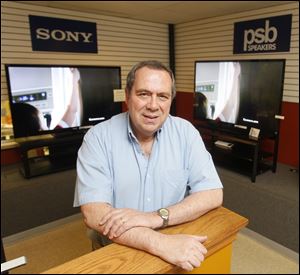
Phil's TV to go dark after 57 years in Toledo
Owner blames online sales, big-box stores for decision
5/11/2012
Randy Auslander, owner of Phil's TV & Appliance, says he considered trying to sell but knew he was unlikely to find a buyer.
The last locally owned TV and electronics store in Toledo's city limits will bid the city adieu next month.
Phil's TV & Appliance at 3141 W. Sylvania Ave. is closing its doors after 57 years, a victim of the economy, competition from big-box retailers, and a growing trend by consumers to avoid bricks and mortar stores in favor of purchasing products at slightly cheaper prices online.
"It's been a real struggle. Each year has been a little worse, and I made some drastic cuts last year," said Randy Auslander, who purchased the business from founder Phillip Markowicz in 1987.
"I was hoping that things would turn things around to help me stay around a little longer. Last year was just about break-even," Mr. Auslander said. "I kept hoping that as the economy improved, sales would improve. The economy is improving, but sales continue to dwindle."
Mr. Auslander considered selling Phil's, but it wasn't likely, especially with the business continuing to decline. Rather than sell, Mr. Auslander, who turns 65 this year, said he will retire and simply close the store after operating it for 25 years.
He has stopped ordering inventory, and his selection of merchandise is down by about two-thirds, he said. "I'll be selling some smaller things on eBay. The bigger things will be harder to sell."
When he bought Phil's in 1987, Mr. Auslander said, 40 independent TV and appliance stores were operating in Toledo. Phil's is the last one left in the city limits.
"There's still Appliance Center, but that's in Maumee, and they're not just TVs and appliances anymore. Jamieson's [Audio/Video] is still around, but they're in Sylvania and they're different from us too," Mr. Auslander said.
Although it managed to stay around for more than a half century, Phil's went through many changes. Mr. Auslander stopped selling appliances in 2005, although he kept the word in the store's name. The firm also began focusing more on home theaters, TV/video components, and audio components.
But Mr. Auslander said that although the store had no problem competing on price with big-box retailers such as Best Buy, Target, Walmart, and the former Circuit City, he had a hard time convincing younger buyers that his prices were competitive.
"Competitiveness was not the problem. The problem was educating the younger generation," he said. Slowly, Phil's customers got older, and younger customers migrated to the big-box retailers, Mr. Auslander said. Phil's, which 20 years ago had 12 employees, was recently down to just three.
Mr. Auslander said his business also was hurt by a newer retail phenomenon -- "showrooming," a term to describe shoppers who test products and seek information at stores but then buy online at lower prices from Internet retailers such as Amazon.com.
Best Buy, Target, and Walmart all complained in 2011 that "showrooming" is damaging their sales and forcing them to close or consolidate stores.
Prospective buyers "would come in or call us to pick our brains about how to hook something up or install a system," Mr. Auslander said. "I used to help people like that in the hope that they would come here. But after a while I gave that up," he said.
"Everything has kind of changed. Years ago we did a big number in camcorders and still cameras. But that's just gone away because of the Internet," Mr. Auslander said. "It's become a game of 'Gee, can I get it cheaper online?' "
Some manufacturers have tried to stabilize prices, making it more difficult for consumers to price-compare products, but the move also has cut profit margins for most retailers. That hurts small independents like Phil's that do not deal in high-volume sales.
Mr. Auslander said that eight years ago he could make a profit of $300 on a 32-inch vacuum-tube TV. But on today's flat-screen TVs, the profit margin is a mere $35. "And that's $35 if they paid cash. It's $25 is they used a credit card," he added.
Contact Jon Chavez at: jchavez@theblade.com or 419-724-6128.